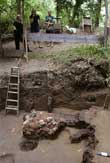
FORT EDWARD, N.Y. (AP) -- This history-rich Hudson River community has yielded a museum's worth of 18th-century military artifacts over the decades, from musket balls to human skeletons. But a colonial soldier's daily lot wasn't all fighting and bloodshed. They had their share of down time, and that's where the sutler came in, offering for sale two of the few diversions from frontier duty: alcohol and tobacco.
A five-year-long archaeological project has unearthed the 250-year-old site of a merchant's establishment that sold wine, rum, tobacco and other goods to the thousands of soldiers who passed through this region during the French and Indian War, when Fort Edward was the largest British military post in North America.
Sutler, derived from the Dutch word for someone who performs dirty work, was the name given to the merchants who arrived on the heels of the British army and sold what the redcoats wouldn't -- or couldn't -- provide at a frontier outpost. With the permission of military officials, sutlers set up shop near a fort's gates, taking advantage of the isolated location to do a brisk trade with off-duty soldiers and officers.
With Albany located some 40 miles down river, the sutlers doing business here served as a precursor to today's convenience stores, said archaeologist David Starbuck.
“For your merchants of the day, this is your big captive audience,'' he said recently while giving a tour of the site. “Booze and tobacco were the big things. I guess things don't change with the years.''
Starbuck said “huge numbers'' of artifacts have been found at the sutler site, located in a wooded area on private property on the Hudson's east bank, just south of where the fort stood.
“It's definitely the richest one we've ever found in Fort Edward,'' said Starbuck, a New Hampshire college professor who has led a series of summertime excavations here and elsewhere in the region since the early 1990s.
High school history teacher Matt Rozell, a veteran of many of Starbuck's digs, found the sutler site in the 1990s after hearing stories of treasure hunters sneaking onto the property to loot artifacts. But the illegal digging only scratched the surface. The real treasures, Rozell said, were buried a foot or more below ground.
Saturday, October 14, 2006
18th Century Store Unearthed
Posted by alilbit at 5:26 PM
Subscribe to:
Post Comments (Atom)


0 comments:
Post a Comment